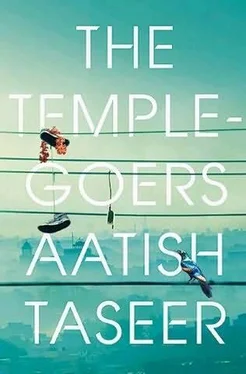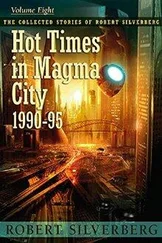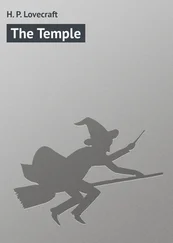It was Eid that night and I finally made it to Zafar’s house. I was glad not to have seen it before. It would have destabilized me. Zafar lived in the Sui Valan section of the old city of Delhi. He picked me up outside Delite cinema, admonishing me for bringing him flowers and sweets. As we entered the old city, some men from the abattoir were unloading a truck of meat. Our rickshaw splashed through a pale brownish-red puddle, its smell and the frenzy of flies giving it away as blood. Narrow streets, crowded that night with bright kerosene lights and people in their new clothes, led us to Zafar’s house. We arrived in front of a darkened entrance. Near an open drain, a bitch tended to her family of fluffy grey puppies. A flight of steep stone stairs, chipped at the edges, led up to a pale green door and a landing lit by a single light.
Zafar had warned me many times on the way how small his house was. ‘But the hearts of the people in it are big,’ he now added. I had imagined his house as a small flat with a kitchen, a bathroom, two rooms perhaps, with at least room enough to stand up and walk around. But Zafar’s house was just a single room, no bigger than a carpet, covered with sheets of checked cloth. Its greasy blue walls were high and there were shelves all around, stacked to the ceiling with hard suitcases and trunks, so that it felt almost like a godown. Everything was neatly in its place: a sewing machine with a pink satin cover; a little shelf with holy Zam Zam water, oils and a pair of scissors; green-covered copies of Zafar’s new book. Zafar’s family of five couldn’t physically fit in the room. That was why he slept on the floor of the magazine office where I had visited him on the day of the demonstration.
‘I once had enough money to buy a better place,’ he said as we sat down, ‘but in 1997, the year when the accounts became computerized, my wife fell from the stairs and all my savings were spent on her treatment.’
She was there now, a fat woman with curly hair and pale skin. She got on her haunches and tried rolling out an oilcloth with roses on it, matching the large red flowers on her black kameez. Then wincing, she stopped and sat back down.
‘My back,’ she said to her husband, who watched her closely. She was smiling, her face was made up, but her eyes suggested damage, almost as if unused to emotions other than distress.
Zafar looked over at his wife, around the room and then at me. ‘I’m thinking of a complete renovation,’ he said with his wheezing laugh, ‘thinking of replacing everything.’
‘We’ll replace you before we replace ammi,’ an offended daughter said from the kitchen area, which was a three-foot ledge with pulses and grains stacked high on one side. Its stone surface was used for washing, the water disappearing through an opening in the floor.
Zafar laughed again. The daughter crawled over and finished unrolling the oilcloth. Another brought out warm bread and meat curry. Zafar gestured to his young son, Atif, who sat slumped in one corner watching cartoons on a twelve-inch television, to come over.
‘All he does is watch these cartoons,’ Zafar said to me as he joined us in our circle. The boy had a thin face, a squint and thick glasses. ‘Speak to him in English; he’s got to learn. He’s meant to be learning in school, but the teachers are very bad. They can hardly speak it themselves. I don’t want another generation to grow up without English. Look at how I’ve lost out.’
I tried speaking to him in English, but he became quiet and ashamed. He replied softly a few seconds later in perfect Urdu.
The men ate, the women watched. I felt embarrassed and asked them why they weren’t eating; they said they already had. Zafar turned gently to me and said, ‘Between Aatish and Atif, I make no difference, you’re both like my sons. Where have you been all these days? You could have at least called your old teacher to say you were OK.’
I used the only excuse I knew would work with him. ‘I’ve been trying to write.’
His face brightened. ‘Writing something modern, I hope,’ he said, ‘something fresh and original. Don’t hark back to the past. Look forward.’ Then using the English words ‘fiction’ and ‘non-fiction’ in both instances to mean fiction, good and bad, he said, ‘In the way men live today, the pressures upon them – and there are great strains and injustices – you’ll find fiction. The past is all non-fiction.’
‘And write in English?’
‘In English,’ he answered firmly. ‘The Indian languages are finished; or, at least, literature in them is finished. When I began there were magazines, poetry meetings, the progressive writers were still around, poets could write for the screen, there were readers, libraries, critics – all gone, swept away in one generation. It’s a very fragile thing, you know, literature; it needs an infrastructure. You can’t spend your life writing into the dark like me.’ The thought of his own writing evoked a memory. ‘I once wrote a string of couplets,’ he said, ‘that all ended in “turned to water”. Very hard to do, you can imagine, to make each couplet finish that way. “In the end I stayed loyal, my friends, to the ways of the age. But in this effort my blood turned to water.” One more,’ he said eagerly, feeling perhaps that I had not gauged his meaning, ‘ “In the toil of a lifetime, each strand flowed away, all moorings were lost, Zafar, when the road turned to water.” ’
He had finished eating and was sitting back against the wall, smoking a Win cigarette. One daughter was clearing away our steel plates and wrapping up the oilcloth; another was making tea on a tiny stove. I asked to wash my hands. Atif rose and opened what I thought was a cupboard door. The bathroom was a single metal sheet, three feet by three feet, leading to a drain. Its fetid air filled the room. Everything was hanging – towels, toothbrushes, clothes, including a green bra, all heaped over a nylon rope. Atif poured out the water from a red plastic urn, then handed me a rag to dry my hands. Its strange colour made me look more closely at it: it was grey, but in a frayed bottom corner, where a button and a pleat still remained, there was a deep indigo stain.
Back in the little room porcelain cups of frothy tea were being passed around. Zafar looked at me expectantly, as if hoping to have generated a response of some sort.
‘So,’ he said finally, ‘is it coming along well?’
‘No, not really,’ I replied. ‘I keep coming up against barriers.’
‘What kind of barriers?’
‘Of language, of class, of having my material in one place, my readership in another. I can’t seem to string it all together.’
Zafar nodded, and putting out the Win in a wooden ashtray, said, ‘Can I offer you a suggestion?’
‘Please.’
‘Write in the first person.’
‘Really? Why?’ I asked, surprised at his specificity.
‘When the terrain is unfamiliar,’ he said, ‘the world new and freshly uncovered, which at this present moment in India it has to be, the first-person narrator plays the guide. He eases the reader’s journey through this uncharted territory; his development becomes part of the narrative. Look at Manto; he even had a narrator called Manto.
‘This, at least,’ he said, shaking with laughter, ‘is the humble opinion of a man who’s never written a line of prose in his life.’ Then serious once more, he added, ‘And lastly there’s the secret ingredient for which no one, no matter how experienced, can help you.’
‘What’s that?’
‘Luck.’ He smiled and offered me a Win.
*
It was ten p.m. when I came back to my mother’s flat. I had left it and returned to it so many times that I felt like a stranger there now. Still, there was something about seeing the lights on in my mother’s study, the room unchanged from my childhood, that gave me the special pleasure of anonymity in a familiar place, something like what a late-night traveller might feel at entering a service flat he has used before. It was quiet but for the occasional swinging of the kitchen door: Shakti closing up for the night, switching off the drawing-room lights, leaving water at my bedside.
Читать дальше












